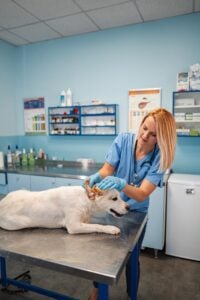7 Warning Signs of Illness Every Pet Owner Should Watch
Table of Contents
For many families in Charlottesville, VA, pets aren’t just animals; they are beloved companions. As a pet owner, one of your biggest responsibilities is recognizing the early signs of illness in pets before small issues turn into major health problems. While some symptoms might seem minor at first, ignoring them could lead to serious pet health problems or even emergencies.
At Autumn Trails Veterinary Center, we know how stressful it can be when your dog or cat starts acting differently. That’s why we’ve created this guide to help you identify pet health warning signs that should never be overlooked.
1. Loss of Appetite in Pets
A healthy appetite is one of the clearest indicators of wellness. If your pet suddenly refuses food or shows little interest in treats, it could signal symptoms of pet illness ranging from digestive issues to chronic illness in pets.
- Dogs: Refusing meals for more than 24 hours should raise concern.
- Cats: Even shorter periods without eating may trigger liver complications.
Tip: A quick pet wellness check with your veterinarian can help determine whether it’s a minor upset or a serious problem.
2. Lethargy in Pets
If your normally energetic pet is suddenly sleeping more or showing little interest in play, this change in behavior may be one of the first pet health symptoms you notice.
- It could indicate infections, pain, or common pet illnesses, such as respiratory or heart disease.
- Senior pets may be more prone to chronic illness that presents as ongoing fatigue.
3. Vomiting in Dogs and Cats
Occasional vomiting may not always signal a problem, but persistent vomiting is a major sign of sick pets. It may point to:
- Ingesting toxic substances
- Parasites or infections
- Digestive or kidney issues
Persistent vomiting is one of the most common pet emergency signs. If it continues, it’s time to take your pet to the vet immediately.
4. Diarrhea in Pets
Similar to vomiting, diarrhea in pets can result from diet changes or stress, but chronic or bloody diarrhea may indicate serious pet health problems like infections, parasites, or inflammatory diseases.
- Watch for dehydration, especially in puppies and kittens.
- Persistent diarrhea requires prompt veterinary care.
5. Sneezing or Coughing in Pets
Occasional sneezing may be harmless, but ongoing respiratory symptoms could be a warning sign of common pet illnesses such as:
- Allergies
- Kennel cough in dogs
- Upper respiratory infections in cats
If your pet’s coughing or sneezing worsens or comes with nasal discharge, this is a pet health warning sign you should not ignore.
6. Changes in Pet Behavior
Behavioral changes often indicate something deeper than mood swings. Examples include:
- Unusual pet aggression in a normally gentle animal
- Excessive hiding in cats
- Restlessness or pacing in dogs
Such pet symptoms should not be ignored may be linked to pain, neurological disorders, or illness.
7. Unexplained Weight Loss or Gain
Sudden changes in your pet’s weight without dietary changes are often signs of illness.
- Weight loss: Could point to diabetes, kidney disease, or cancer.
- Weight gain: May suggest thyroid issues or reduced activity due to chronic illness in pets.
Regular weigh-ins during preventive pet care visits are the best way to track this subtle but important health metric.
When to Take Your Pet to the Vet

Recognizing the early signs of illness in pets helps you act fast and prevent minor issues from becoming life-threatening. If you notice any of these pet health symptoms, don’t wait. Understanding when to worry about your pet’s health can be the difference between quick treatment and long-term complications. A professional pet wellness check ensures your furry companion gets the care they need.
Protect Your Pet’s Health Today
At Autumn Trails Veterinary Center in Charlottesville, VA, we’re dedicated to keeping your pets healthy and happy through preventive pet care and compassionate treatment. Call us today at (434) 971-9800 to schedule a wellness exam and make sure your pet is on the right track to lifelong health.




